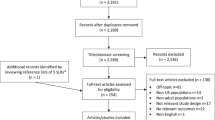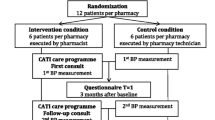Abstract
OBJECTIVE: To evaluate physicians’ preferences for referring patients to, and using information from, active-controlled trials (ACTs) versus placebo-controlled trials (PCTs) of new antihypertensive drugs.
DESIGN AND SETTING: Nationwide mailed survey, with telephone contact of nonresponders to assess nonresponse bias.
PARTICIPANTS: One thousand two hundred primary care physicians randomly selected from the American Medical Association’s Master File. Of 1,154 physicians eligible to respond, 651 (56.4%) returned completed questionnaires.
MEASUREMENTS AND MAIN RESULTS: We measured physicians’ stated willingness to encourage hypertensive patients to enroll in ACTs and PCTs of new antihypertensive drugs, their views of the relative merits of ACTs versus PCTs, their stated willingness to prescribe new drugs tested in ACTs or PCTs, and their views regarding the overall justifiability of the 2 designs. Physicians were significantly more likely to indicate they would encourage their patients to enroll in ACTs than in PCTs (P<.0001). Physicians thought ACTs provided more valuable information for their practices, were more likely to lead to a public health benefit, offered enrolled patients greater opportunity for personal benefit, and were less likely to expose enrolled patients to unnecessary risks (all P<.0001). Physicians were more likely to prescribe new drugs that had been compared in ACTs (P<.0001), and viewed ACTs as a more justifiable method for testing new antihypertensive drugs (P<.0001). There was no evidence of nonresponse bias for these main results.
CONCLUSIONS: Although PCTs remain the standard method for testing new antihypertensive drugs, physicians strongly prefer ACTs. Using ACTs to test new antihypertensive drugs may enhance the efficiency of patient recruitment and more strongly influence physicians’ prescribing practices.
Similar content being viewed by others
References
Weber MA. The ethics of using placebo in hypertension clinical trials. J Hypertens. 1999;17:5–8.
Kisch ES. Is the use of placebo in antihypertensive drug studies ethical? J Hypertens. 1999;17:147–9.
Preston RA, Materson BJ, Reda DJ, Williams DW. Placebo-associated blood pressure response and adverse effects in the treatment of hypertension. Arch Intern Med. 2000;160:1449–54.
Halpern SD, Karlawish JHT. Placebo-controlled trials are unethical in clinical hypertension research. Arch Intern Med. 2000;160:3167–8.
Ellenberg SS, Temple R. Placebo-controlled trials and activecontrol trials in the evaluation of new treatments. Part 2: practical issues and specific cases. Ann Intern Med. 2000;133:464–70.
Temple RJ. When are clinical trials of a given agent vs. placebo no longer appropriate or feasible? Control Clin Trials. 1997;18:613–20.
Temple R, Ellenberg SS. Placebo-controlled trials and activecontrol trials in the evaluation of new treatments. Part 1: ethical and scientific issues. Ann Intern Med. 2000;133:455–63.
Kass EH. Ethical considerations in the planning of hypertension treatment trials. Ann N Y Acad Sci. 1978;304:412–23.
Feinstein AR. An additional basic science for clinical medicine: II. The limitations of randomized trials. Ann Intern Med. 1983;99:544–50.
Kramer MS, Shapiro SH. Scientific challenges in the application of randomized trials. JAMA. 1984;252(19):2739–45.
Korn EL, Baumrind S, Randomised clinical trials with clinician-preferred treatment. Lancet. 1991;337:149–52.
Hennekens CH, Buring JE. Validity versus generalizability in clinical trial design and conduct. J Card Fail. 1998;4(3):239–40.
Halpern SD, Metzger DS, Berlin JA, Ubel PA. Who will enroll? Predicting participation in a phase II AIDS vaccine trial. J Acquir Immune Defic Syndr. 2001;27:281–8.
Jones B, Jarvis P, Lewis JA, Ebbutt AF. Trials to assess equivalence: the importance of rigorous methods. BMJ. 1996;313:36–9.
Fleming TR. Design and interpretation of equivalence trials. Am Heart J. 2000;139:S171–6.
Freedman B. Scientific value and validity as ethical requirements for research: a proposed explication. IRB: Rev Hum Subjects Res. 1987;9:7–10.
Emmanuel EJ, Wendler D, Grady C. What makes clinical research ethical? JAMA. 2000;283:2701–11.
Welton AJ, Vickers MR, Cooper JA, Meade TW, Marteau TM. Is recruitment more difficult with a placebo arm in randomised controlled trials? A quasirandomised, interview based study. BMJ. 1999;318:1114–7.
Food and Drug Administration. Guidance for industry: E 10. Choice of control group and related issues in clinical trials. Washington, DC: Department of Health and Human Services; 2001.
Schoenberger JA. Ethical considerations in the planning of hypertension treatment trials. Discussion. Ann NY Acad Sci. 1978;304:420–1.
Halpern SD, Ubel PA, Berlin JA, Asch DA. A randomized trial of $5 versus $10 monetary incentives, envelope size, and candy to increase physician response rates to mailed questionnaires. Med Care. In press.
Schlesselman JJ. Case-Control Studies: Design, Conduct, Analysis. New York: Oxford University Press; 1982.
Taylor KM, Margolese RG, Soskolne CL. Physicians’ reasons for not entering eligible patients in a randomized clinical trial of adjuvant surgery for breast cancer. N Engl J Med. 1984;310:1363–7.
Benson AB, Pregler JP, Bean JA, et al. Oncologists’ reluctance to accrue patients onto clinical trials: an Illinois Cancer Center study. J Clin Oncol. 1991;9:2067–75.
Taylor KM. Integrating conflicting professional roles: physician participation in randomized clinical trials. Soc Sci Med. 1992;35:217–24.
Taylor KM. Physician participation in a randomized clinical trial for ocular melanoma. Ann Ophthalmol. 1992;24:337–44.
Taylor KM, Feldstein ML, Skeel RT, Pandya KJ, Ng P, Carbone PP. Fundamental dilemmas of the randomized clinical trial process: results of a survey of the 1,737 Eastern Cooperative Oncology Group investigators. J Clin Oncol. 1994;12:1796–805.
Vastag B. Breast cancer prevention study aims to overcome drug bias. JAMA. 2001;285:399–400.
MacIntyre IMC. Tribulations for clinical trials. Poor recruitment is hampering research. BMJ. 1991;302:1099–100.
Peabody JW, Luck J, Glassman P, Dresselhaus TR, Lee M. Comparison of vignettes, standardized patients, and chart abstraction: A prospective validation study of 3 methods for measuring quality. JAMA. 2000;283:1715–22.
Misbin RI. Placebo-controlled trials in type 2 diabetes. Diabetes Care. 2001;24:773–4.
Chmura Kraemer H. Statistical analysis to settle ethical issues. Arch Gen Psychiatry. 2000;57:327–8.
Michels KB. The placebo problem remains. Arch Gen Psychiatry. 2000;57:321–2.
Boissel J-P. Impact of randomized clinical trials on medical practice. Control Clin Trials. 1989;10:120S-34S.
Boyle PJ, Callahan D. Physicians’s use of outcomes data: moral conflicts and potential resolutions. In: Boyle PJ, ed. Getting Doctors to Listen: Ethics and Outcomes Data in Context. Washington, DC: Georgetown University Press; 1998:3–20.
Berlowitz DR, Ash AS, Hickey EC, et al. Inadequate management of blood pressure in a hypertensive population. N Engl J Med. 1998;339:1957–63.
Brown MJ, Palmer CR, Castaigne A. Morbidity and mortality in patients randomised to double-blind treatment with a long-acting calcium-channel blocker or diuretic in the International Nifedipine GITS study: intervention as a goal in hypertension treatment (INSIGHT). Lancet. 2000;356:366–72.
Hansson L, Hedner T, Lund-Johansen P, et al. Randomised trial of effects of calcium antagonists compared with diuretics and beta-blockers on cardiovascular morbidity and mortality in hypertension: the Nordic Diltiazem (NORDIL) study. Lancet. 2000;356:359–65.
Author information
Authors and Affiliations
Corresponding author
Additional information
This work was supported by an unrestricted grant from Merck and Company to the Leonard Davis Institute of Health Economics.
Rights and permissions
About this article
Cite this article
Halpern, S.D., Ubel, P.A., Berlin, J.A. et al. Physicians’ preferences for active-controlled versus placebo-controlled trials of new antihypertensive drugs. J GEN INTERN MED 17, 689–695 (2002). https://doi.org/10.1046/j.1525-1497.2002.11024.x
Issue Date:
DOI: https://doi.org/10.1046/j.1525-1497.2002.11024.x




